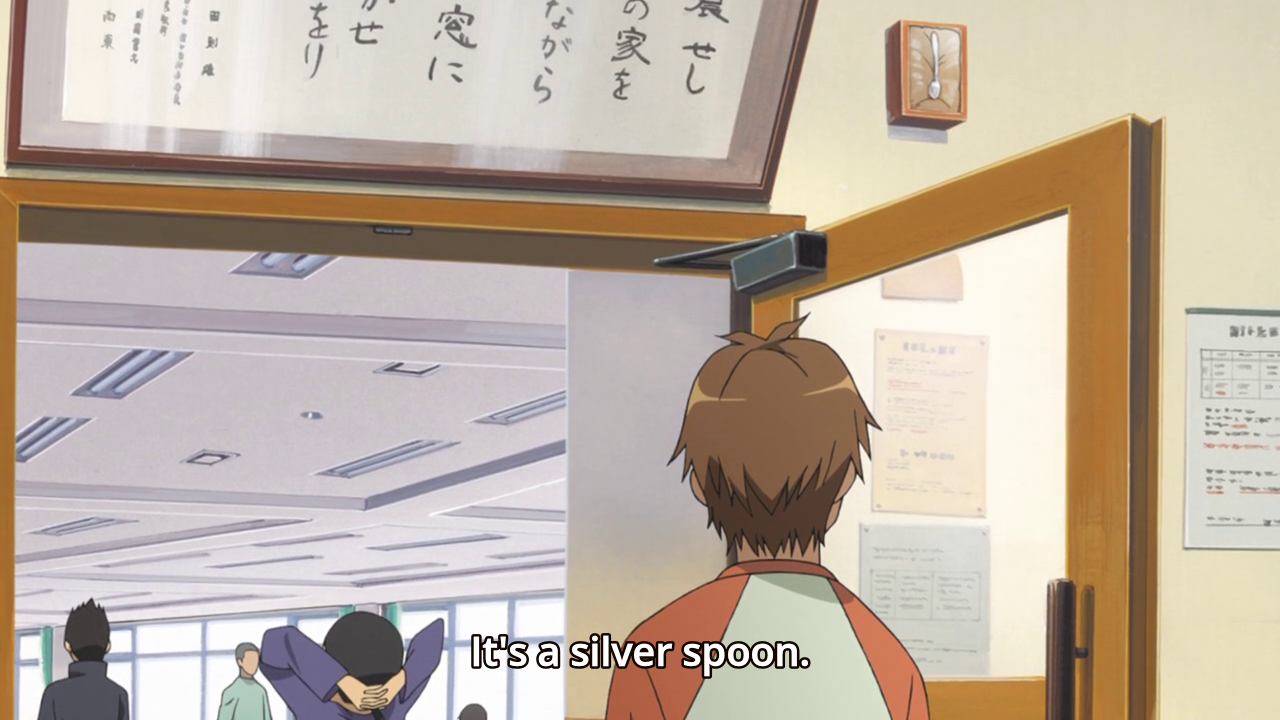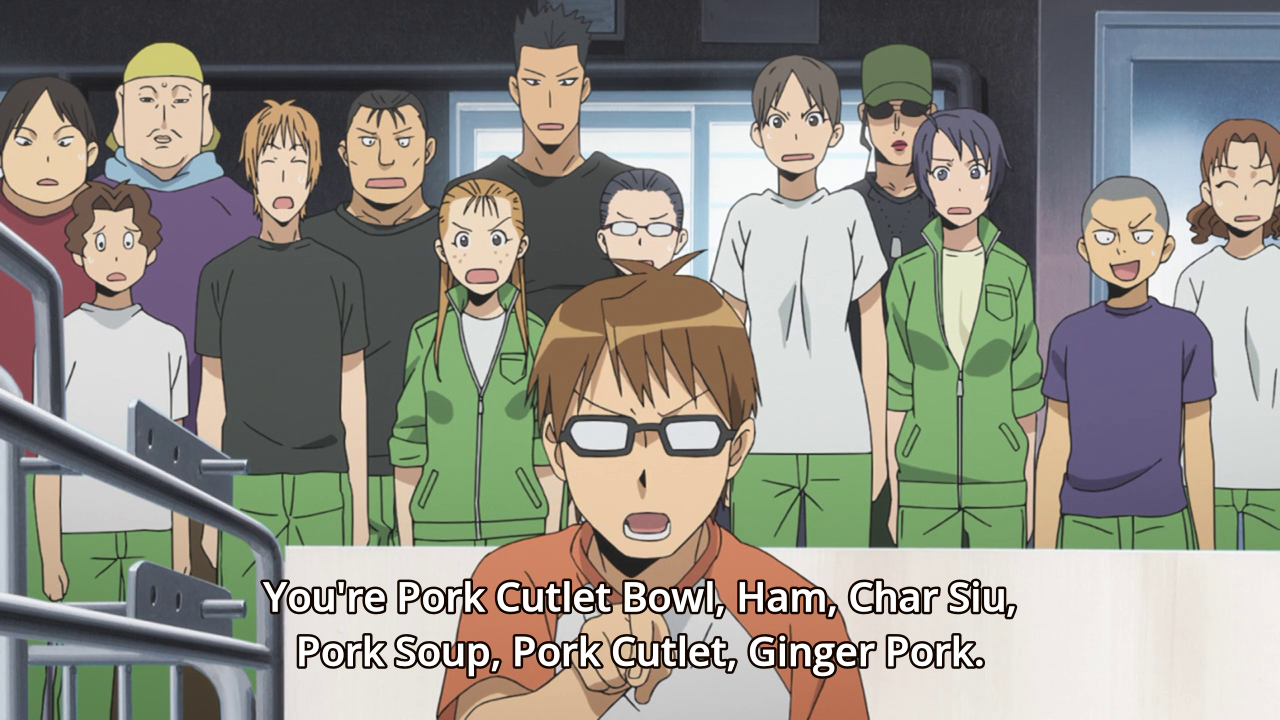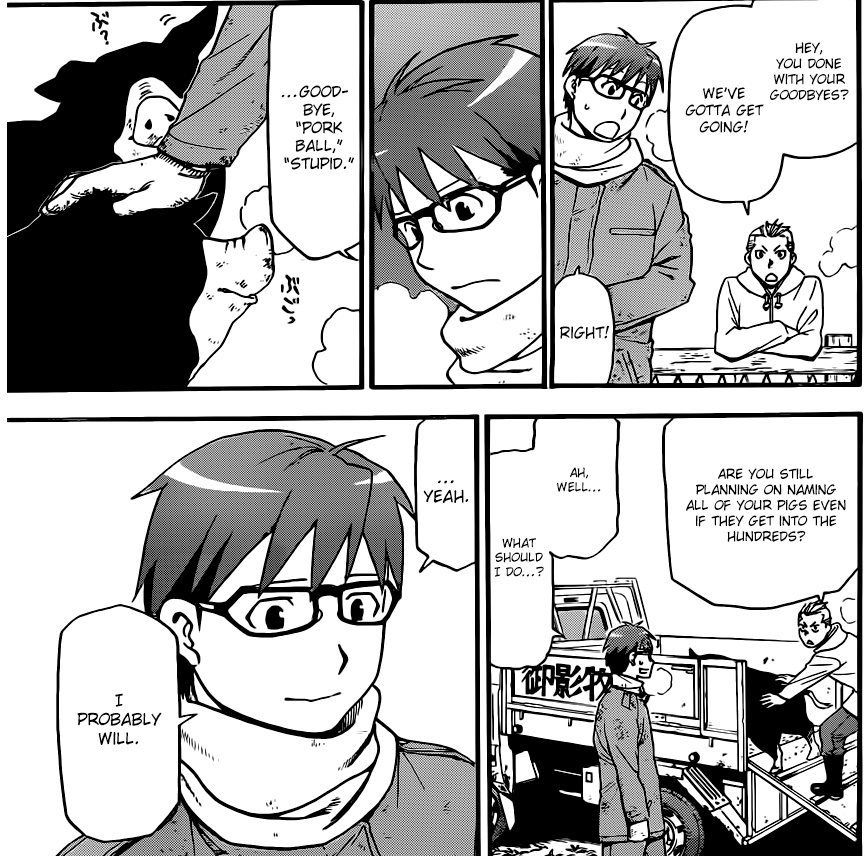A quick note: if you haven’t already read it, I would highly recommend reading my previous blog post on the setting of Silver Spoon, as the setting is a highly important lense the themes of the series are viewed through. In addition, this post will contain spoilers for the manga past the point the anime covers. As it’s a slice-of-life, there aren’t any groundbreaking plot twists, but if you want to experience the manga entirely for yourself, you should do so before reading this article.
Silver Spoon, as a slice-of-life, has a plot that’s going on mostly in the background. However, it does have very strong themes that are presented almost immediately.

“There’s a saying in other countries that saying those born holding a silver spoon will never want for food as long as they live. It’s like a symbol of prosperity.”
“I’ve heard that in some places, they give a silver spoon to a newborn in the hopes that they will never have to worry about going hungry. Times are hard right now in this recession, but you could say that all the kids born into farming families had a silver spoon because they don’t have to worry about not being able to make their livelihood.”
~Mayumi Yoshino and Aki Mikage, Chapter 63
The idiom “born with a silver spoon in his/her mouth” is generally used to describe someone as being born into wealth and privilege. It’s a good idiom in a lot of ways. Silver implies money. The fact they’re born with it in their mouth implies that no work needs be done and that others will provide for them. But, most importantly for this series, it implies that the subject will not want for food, one of the most basic needs of humans.
Silver Spoon focuses on that last part and consequently twists the meaning of the idiom a bit. You don’t need a lot of material things other than food. It doesn’t matter if you don’t have money; if you can eat, you can survive. And if you can produce that food by yourself, that’s what truly makes someone blessed. That’s why the school hangs a silver spoon above the dining hall: to tell the students–and the reader–that wealth is not nearly as important as self-sufficiency.
This is the most prevalent and important theme in the show, but there are a few others. I’ll go through them as the show focuses on them.
On Loving Food
“If you insist on naming him, make it ‘Pork Bowl.'” ~Tamako Inada, episode 3
One of the earliest and biggest struggles Hachiken faces is coming to terms with, well, “how the sausage is made” (to the point of actually making sausage at one point in the manga, as if the phrase wasn’t already literal enough). He freaks out upon learning that eggs come from a chicken’s anus. He sees a chicken decapitated right in front of him, and hesitates when he’s offered some of it later on. But this struggle is best exemplified in the primary arc that runs through the first season, which is actually expanded a bit from the manga. In it, Hachiken sees a runt piglet, the eighth in the litter, and immediately gains a fondness for it (probably helped by the fact that his name contains “hachi,” or “eight”). Upon seeing him growing attached to it, his classmates warn him that it’s not a pet and that he’ll inevitably end up as meat. He ends up naming it after food (Pork Bowl, after Tamako’s suggestion), in an attempt to help him raise it more objectively.
Years ago, I overheard my father talking about a conversation he’d heard, where some people at the county fair were asking the owner of an animal what its name was. The owner in question responded with “Ya don’t name whatcha eat.” That’s a phrase that’s stuck with me just because of just how simple but poignant it is. Farmers love their animals. They have to, since they’re their source of livelihood. But at the same time, they’re not pets. They’re kept at an arm’s length. Sure, some animals we name. Ones kept for breeding, for example. Milking cows. Laying chickens. But those are all ones we plan on keeping around. Sometimes, however, a calf ends up crippled or loses its mother or there’s some other issue that requires us to take a more hands-on approach by bottle-feeding it, at which point we end up developing a name for it naturally. We gave one calf with a broken leg a make-shift cast made out of PVC pipe and began calling it “Peg-leg,” which became “Piglad” after my kid sister’s botched attempts at saying it.
We ate Piglad.
It wasn’t all that difficult, honestly. Even though we’d named him, we still managed to not get that attached. Sometimes, things are different. My sister raised a pair of lambs. One unfortunately passed away, but she turned a huge profit when she sold the other one, plus the family got some of the meat. But for my sister, those were her lambs. She’d bought them. She’d raised them. She’d taken care of them and grown to love them. And she refused to eat them. For years afterwards, she swore off eating lamb. I’m not sure if she’s started eating it again, or whether she refuses to to this day.
This is something everyone working with animals has to reconcile: the idea of loving something that you know will ultimately become food. It’s easy to eat meat when your only interaction with it is at the grocery store. It’s a lot harder when you’ve become well-acquainted with that same meat when it was still alive. Farm kids learn early on not to think of animals on the same level as pets. That’s precisely why Hachiken and Pork Bowl’s story is so compelling: because he’s coming to terms with this struggle later than most of his peers at the school have.
When Pork Bowl fails to grow as big as the rest of his litter and risks being rated as off-grade (the worst grade of meat, which sells for a mediocre price), Hachiken takes it upon himself to research how to fatten him up, knowing that it’ll only be harder for him to eventually part with him.
“The rest of us never really thought a whole lot about killing and eating them, you know. It was something we took for granted. But you’re flailing around thinking about it. Just being brutally honest. But it’s become harder for me to make fun of you. Maybe it’s important to reconsider things you’ve always taken for granted.” ~Mayumi Yoshino, episode 10
When the time comes, Hachiken decides to buy Pork Bowl. Not to keep as a pet. He buys the meat from the butchered pig. This is the climax of this particular character arc for Hachiken. He’s facing the paradox of loving food–not loving to eat, but caring for living beings that you know are destined to die and be eaten–head on. This particular sequence was one that brought me face-first with a paradox of my own: one where I was both smiling and crying at the same time. It was just as heartwarming as it was heartwrenching to see Hachiken finally reconcile this dilemma. He doesn’t just shrug and get over it, either. He throws himself into it head-on. He goes from naming the pig to feeding it and giving it special attention to buying all 50 kilos of it and preparing it to turn into bacon by himself, ending with him finally, tearfully but with anticipation, chowing down on, well, a Pork Bowl pork bowl. He’s fully determined to push past his reservations about eating meat he loved with brute force.
![[HorribleSubs] Gin no Saji - 10 [720p].mkv_snapshot_21.06_[2016.05.25_04.29.17]](https://daladybug.productions/wp-content/uploads/2016/05/horriblesubs-gin-no-saji-10-720p-mkv_snapshot_21-06_2016-05-25_04-29-17.jpg)
Even through all his growth, however, Hachiken never fully changes. He decides that he can’t just immediately come to grips with not growing attached to animals and names the very next litter.

In fact, even way down the road, once he’s found his place in the agricultural world and is about to start his own company, he still hasn’t completely changed his ways.

On Hard Work and Fighting For Your Dreams
“Even if you have a dream, and know what you need to make your dream come true, that’s not enough.” ~Shinnosuke Aikawa, episode 3
A substantial number of the students of Ezonoo are given focus, and most of those have some form of stated dream. For example, Inada wants to take over her family farm in order to expand it and make it even more profitable and Yoshino wants to work with cheese production, to the point of going abroad to study in France. Some, however, have a very difficult road ahead of them. Aikawa wants to be a vet, but he has a weak stomach and can’t handle blood. He often confides in Hachiken, telling him that, even though he knows what he wants to do and has a plan to accomplish it, that on its own isn’t going to be enough. He’ll have to force himself through plenty of things he finds unpleasant in order to achieve his dream.
Mikage’s path is one that will involve overcoming her passive nature. She wants to work with racehorses instead of inheriting the family dairy farm, which her parents expect her to do. In order to achieve this, she has multiple hurdles to face: working up the courage to explain her dream to her family, managing to reach an agreement with them, and improving her sub-par grades enough that she can enter college and work towards getting the education she needs in order to do what she wants. It’s also clear that this is not something she’s able to do alone, as she turns to Hachiken for emotional support when confronting her family and for tutoring as she studies for college entrance exams. This is a task too big for her alone, but with help, she may just make it happen.
And then there’s Komaba. His family is going through tough times, and he’s focusing a lot of his extra energy into baseball, hoping to go pro in order to save the farm. Komaba’s story doesn’t have a happy end. Their team barely loses the regional championship match, falling just short of the national tournament. This essentially destroys Komaba’s last chance to pay off their farm’s debts and bankrupts them. Komaba’s dream is crushed as he is forced to drop out of school to work.
That’s where the story ends in the anime, but in the manga, his storyline isn’t over just yet. The plot has not progressed to the point where we can see what Komaba has planned, but Hachiken’s older brother is apparently tutoring him. Whatever the case, it’s clear that, while Komaba’s old dream is no longer viable, he still has a chance to make some form of comeback. Failure is not the end. It’s going to take a lot of hard work, but Komaba still has a future and can find a new dream worth fighting for.
And on the subject of finding dreams, we’ve come to our protagonist, Hachiken. Hachiken stands out from many of the Ezonoo students in that he doesn’t have a dream. That doesn’t mean he’s working any less hard, though. He’s arguably working even harder, as he’s taking multiple projects on himself in an attempt to figure out what he wants to do in his life. Whether it’s making bacon from a pig he helped raise, renovating a stone oven and organizing a pizza party using it, taking on vice-president duties in the equestrian club, or picking up various jobs at the school’s cultural festival, he does it with enthusiasm and a desire to find a place where he belongs. He works so hard at searching for a dream and, consequently, a place he can call home, that he ends up working himself to the point where he collapses from exhaustion.
![[HorribleSubs] Gin no Saji S2 - 05 [720p].mkv_snapshot_21.17_[2016.06.26_02.28.25]](https://daladybug.productions/wp-content/uploads/2016/06/horriblesubs-gin-no-saji-s2-05-720p-mkv_snapshot_21-17_2016-06-26_02-28-25.jpg)
Hachiken ultimately does find a dream worth fighting for. Of course, that brings up to our final, and perhaps most important, theme.
GINSAJI
“In junior high, Hachiken seemed to be held hostage by the thought that he had to make something of himself, so much so that he had no idea what kind of person he wanted to be. I sent him your way, thinking he might gain some insight.” ~Hachiken’s councilor to the Ezonoo principal, episode 4
The previous two themes are integral to this final one: the idea of self-sufficiency. Hachiken’s reason for coming to Ezonoo in the first place is not that he has any real drive or motivation. It’s the opposite: he’s running away. He worked hard in school but couldn’t achieve the results he wanted. So he ran away to a school in the sticks where he hoped he’d be able to easily excel. While he ultimately does excel, it’s far from easy, and it’s not in the way he wanted.
The idea of the silver spoon as presented in Silver Spoon does not represent having enough wealth or power that others will feed you, but rather having the power to feed yourself. Self-sufficiency is true wealth. Through coming to grips with caring about food and finding a dream to call his own, Hachiken ends up finding self-sufficiency.
Hachiken was essentially, before coming to Ezonoo, dependent. He did what was his father and the school system expected him to. I’m not the right person to expound on Japanese culture, but from what I’ve heard, there are a lot of societal expectations in Japan. From my understanding, it is a very fast-paced, economically-driven society. Hachiken’s father, as a stern businessman, reflects this. By getting away from that urban society, Hachiken is able to become his own person and make his own decisions in life.
Hachiken’s dream is, ultimately, to learn how to provide for himself as his own person. It takes him a while to find out what sort of person he is, but through helping organize events like a school pizza bake using a stone oven, taking a hands-on approach raising a piglet and ultimately processing the bacon himself, and other experiences gained at Ezonoo, he comes to the conclusion that he wants to take an active hand in deciding his own future. He wants to take what he’s learned and use it to become an entrepreneur. The name of the business he starts? GINSAJI, in reference to the title of the series. In naming his business, Hachiken is declaring that he has finally found a way to be self-sufficient. He’s found a dream he can work hard to pursue, and he’s found it through learning to love animals.
This is what makes Silver Spoon such a satisfying series for me. It’s not just about some city kid who gets pulled into farm life and learns to love animals. The message is delivered through that lens, yes, but the message itself is one that’s incredibly applicable and relevant to all of us. Many of us will develop dreams and aspirations. It may take a while to figure out what they are, we may have a difficult road ahead, and sometimes ambition and hard work isn’t going to make that dream happen. Sometimes they just aren’t meant to be. However, no matter what happens, as long as you have the ability and motivation to work hard and provide for yourself, you can ultimately turn things around. Self-sufficiency is something far more valuable than wealth or luck, and awkward, out-of-his-element Hachiken shows that it’s something that can be acquired. Through his experience at Ezonoo and finding his own path, Hachiken has experienced a rebirth as a person: one born with a silver spoon.